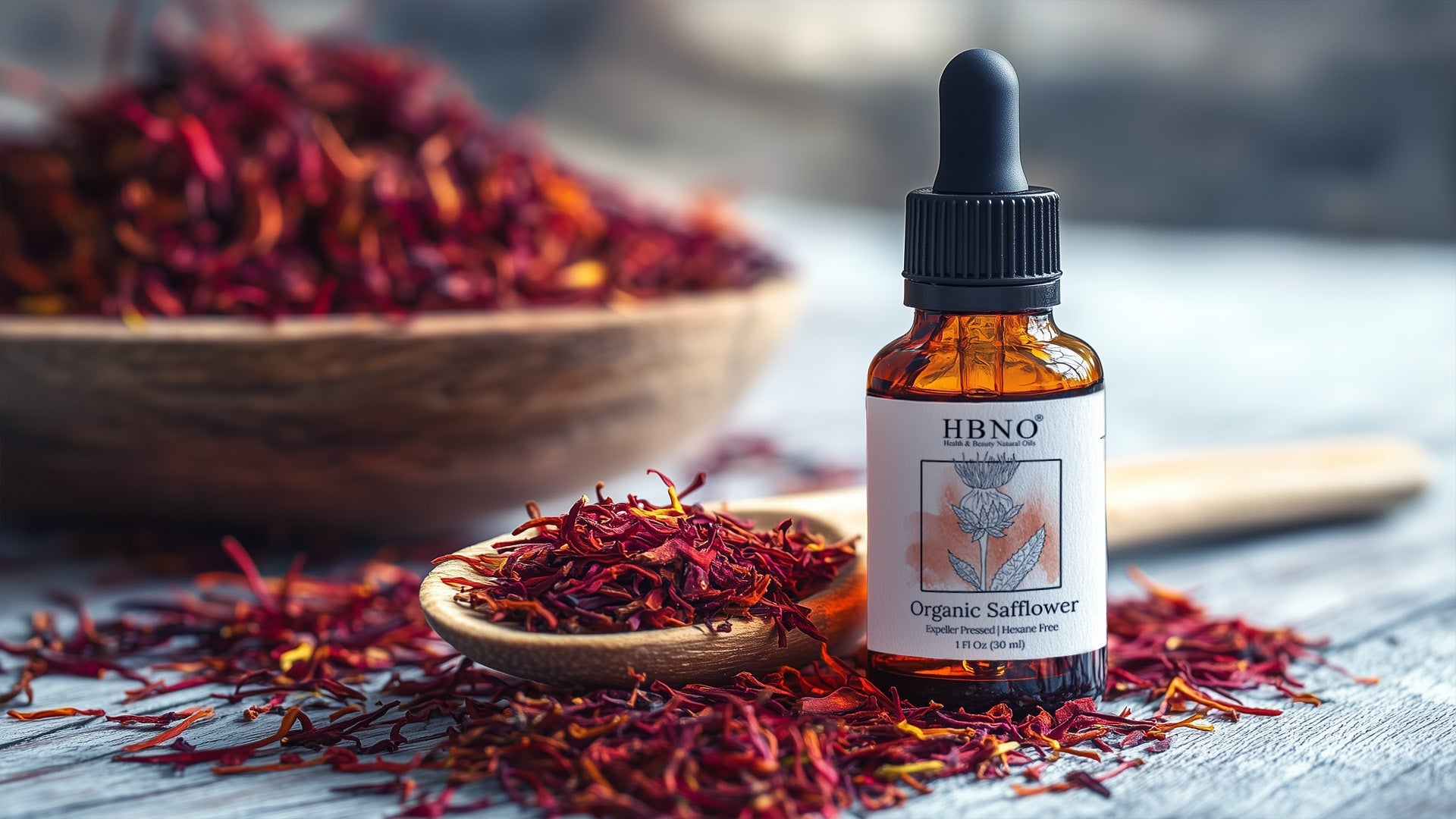
Safflower Oil Benefits for Skin, Hair, and Its Side Effects
Safflower oil, derived from the seeds of the safflower plant, is widely used in skincare, haircare, and general wellness routines. Its light texture makes it suitable for daily use and for those with different skin types.
Many people use safflower oil in facial oils, scalp blends, or cooking to complement their lifestyle. This article explores safflower oil benefits for skin, hair, and overall health, highlighting key uses and everyday applications.
It also includes a section on potential side effects and practical ways to add safflower oil to your personal care or diet regimen.
Safflower Oil Benefits for Skin
Safflower oil is appreciated for its ability to support healthy skin. Here's a breakdown of how it can benefit the skin:
1. Moisturization and Hydration
Safflower oil is light and easily absorbed into the skin, providing moisture without making the skin feel greasy. It is ideal for dry and dull skin, helping to maintain a healthy, smooth texture.
2. Improvement in Skin Texture
Regular application of safflower oil may result in smoother skin by promoting an even texture. It helps balance the skin's moisture levels, making it appear more vibrant and fresh.
3. Cooling Effect on Irritated Skin
For those experiencing occasional skin irritation, safflower oil may be a helpful remedy. It may assist in reducing redness and providing comfort to the skin when it feels sensitive.
4. Supporting Skin Protection
Safflower oil contains antioxidants that can help protect the skin from environmental stressors, maintaining its overall health. By using safflower oil regularly, you may notice healthier and more resilient skin.

Safflower Oil Benefits for Hair
Safflower oil can also contribute positively to the condition of your hair. Here are some benefits for your hair health:
1. Moisturizing Dry Hair
Safflower oil can penetrate the hair shaft, moisturizing it from within. If your hair feels dry and lacks luster, this oil can help restore its natural softness and shine.
2. Support for Scalp Health
For those with dry or flaky scalps, safflower oil can be beneficial. It nourishes the scalp, potentially reducing flakiness and contributing to overall scalp comfort.
3. Promoting Healthy Hair
Safflower oil may also help create a good environment for hair to grow stronger and healthier. It can nourish the hair from the roots, which might help reduce breakage and split ends.
4. Shine and Smoothness
When applied to the hair, safflower oil can help smooth the cuticle, making hair look shinier and less frizzy. This can be especially helpful for individuals with curly or wavy hair.

Safflower Oil for Overall Health
Safflower oil is not just beneficial for skin and hair-it can also contribute to general well-being. Here's a look at how it may be useful:
1. Supporting the Body's Functioning
Safflower oil can be part of a healthy diet when used in moderation. It can be used in baking, as it has a mild flavor that works well with various dishes. It may also help maintain balance in the body.
2. Contributing to a Balanced Routine
Incorporating safflower oil into your daily regimen can support your body's natural balance. Whether used externally for skin and hair care or consumed in food, safflower oil can be a helpful addition to your routine.
Safflower Oil Side Effects
While safflower oil is generally safe for most people, it is important to be aware of any potential side effects:
1. Skin Sensitivity
Though rare, some individuals may experience an allergic reaction when applying safflower oil to their skin. It's always recommended to do a patch test before using any oil extensively.
2. Potential Acne Breakouts
In some cases, if used excessively, safflower oil may lead to clogged pores, which could cause breakouts. This can be avoided by using the oil in moderation and choosing products suitable for your skin type.

3. Possible Interactions with Medication
Safflower oil may interact with certain medications. If you are on medication, particularly for blood pressure or clotting issues, consult your doctor before incorporating safflower oil into your diet or skincare routine.
Final Thoughts
Safflower oil proves to be a versatile option for skin, hair, and overall wellness. Its lightweight texture allows for easy absorption and makes it a popular choice for many personal care routines.
Whether used in scalp applications, facial care, or daily meals, safflower oil fits into a wide range of uses. While exploring these options, sourcing high-quality oils is essential-HBNO offers a selection that may suit different preferences and formulations.
As with any essential oil, it's wise to start with small amounts and observe how your skin or hair responds, especially if you have sensitivities. With careful use, safflower oil can be a practical and consistent part of your daily routine.
References:
-
Known for its light texture and rich nutrient profile, safflower oil offers a variety of benefits, especially for skin and hair health.
-
The extraction process typically involves either cold-pressing or solvent extraction, resulting in a pale yellow or clear liquid that is rich in polyunsaturated fats.
-
Overall, safflower oil's versatility and gentle properties make it a popular choice for both culinary and cosmetic applications, suitable for a wide range of skin types and hair textures.
-
As skin loses moisture, it can appear saggy or dull, but safflower oil works to lock in hydration, helping to keep the skin firm and smooth.
-
Safflower oil has been shown to support hair growth, particularly in individuals experiencing thinning or brittle hair.
-
Extracted from the seeds of the safflower plant, this oil is known for its light texture and high content of essential fatty acids, particularly linoleic acid.
-
One of the key benefits of safflower oil is its versatility.